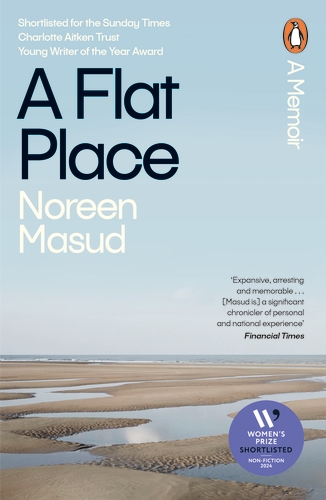10th November 2025

As flatness offers respite to Noreen Masud, A Flat Place offers an antidote to the tropes and constructs that threaten to make some nature writing a slightly contrived product of a flourishing commercial market; a central aspect to its success is the originality of its form: part environmental writing, part memoir, part socio-political essay, part polemic. And somehow, using the starkest landscapes as her lens, Masud is able to write about place and race, and fauna and trauma simultaneously.
In her introduction, she questions, ‘Why do I love flat landscapes so much? Why do they quieten the thing in me that’s always crying? Flatness is a puzzling thing to love’ and throughout the memoir, the reader seems to ponder similar quandaries: what is it about this writer’s voice that is so engaging – is it her abruptness, her honesty, her humour? One endearing feature is that Masud does not profess to be an ecologist, or a nature-writer. She loses her way, arrives unprepared, acknowledges when she is underwhelmed, or finds a person or situation overbearing; when she picks through the bones of a bird skeleton, she doesn’t seek to intimidate or impress with esoteric knowledge; she archives, she processes, she shares.
In the UK edition, on the front page, below the title A Flat Place, are the words ‘a memoir’, but on the US version the subtitle is extended to read, moving through empty landscapes, moving through complex trauma. The epilogue explains how the book began ‘solely’ as ‘a study of encounters with flat landscapes’, but the aspect of psychogeography was so intrinsic that the narrative needed to adapt: ‘I came to understand that the complex trauma I sustained in my early life was an element which could not be omitted.’ And so the ‘first flat place’ is the emotional and geographical juxtaposition between the ‘green misted fields…glimpsed from far away’ and ‘the flat stone floors’ of her house in Pakistan. Masud reflects on a youth where memory is elusive, where her ‘father put his two big hands on the ground around us, and we crawled around inside’. It is distinctly clear that both she loved and loathed this controlling father; less clear is how she existed so long in the hiatus between fear and fascination that a sense of loss, perhaps grief, became intrinsic long before she emigrated to the UK with her mother and sister. Akin to any prolonged study of a surface, Masud frequently discusses depth in the memoir: depth of vision, volume of history. After the first chapter, the reader begins to understand that below these liminal spaces, ‘very gently and deeply, like a whale passing beneath a boat, a long animal just under the surface’, is the presence of her father.
To read the full article, click the link below
https://modronmagazine.com/2024/09/15/a-review-of-noreen-masuds-a-flat-place-by-glyn-f-edwards/